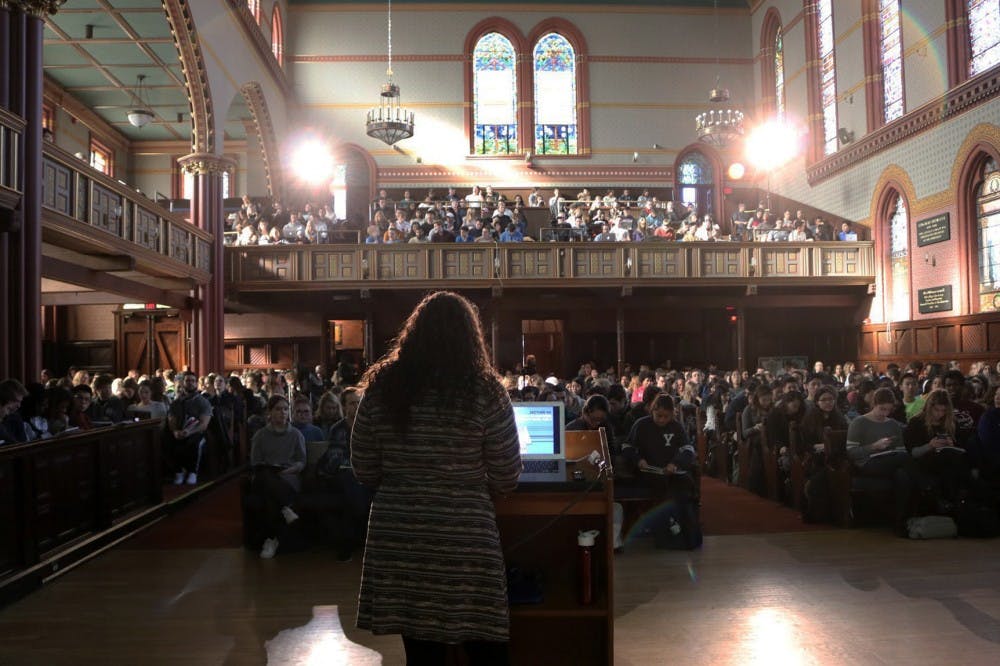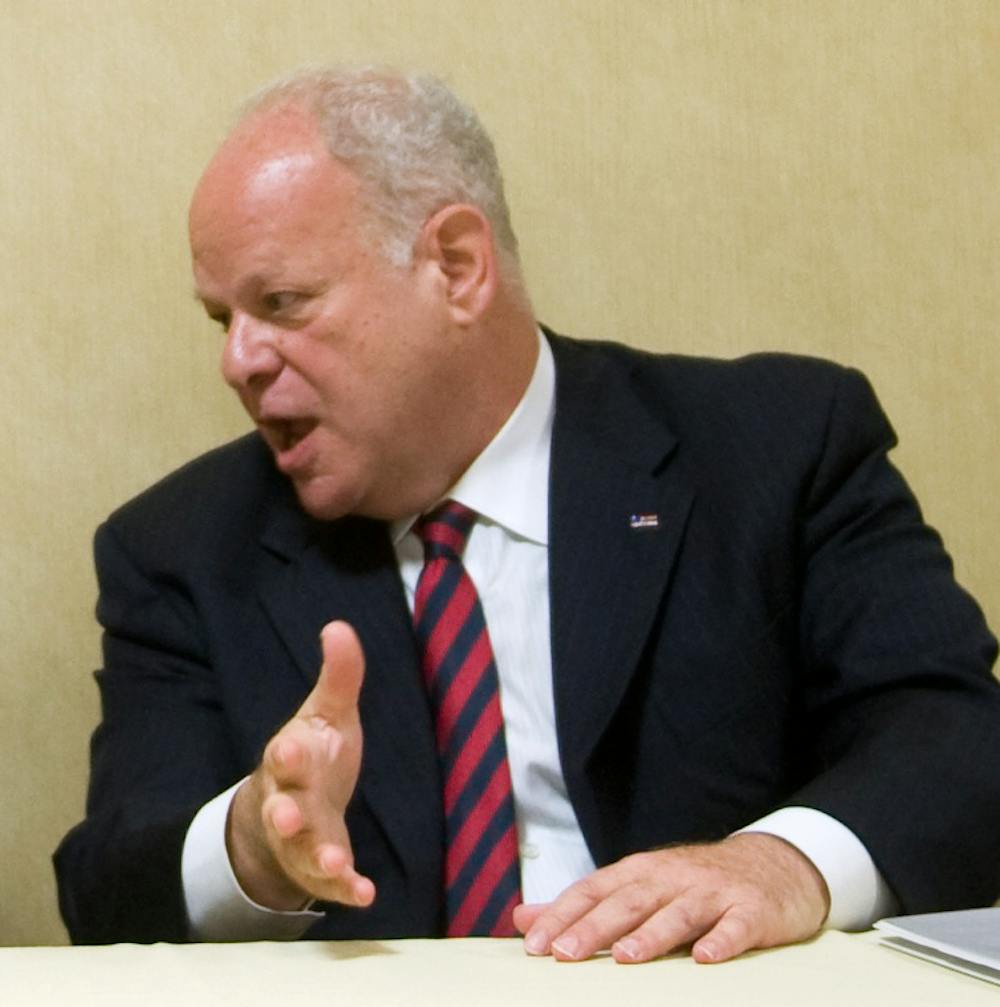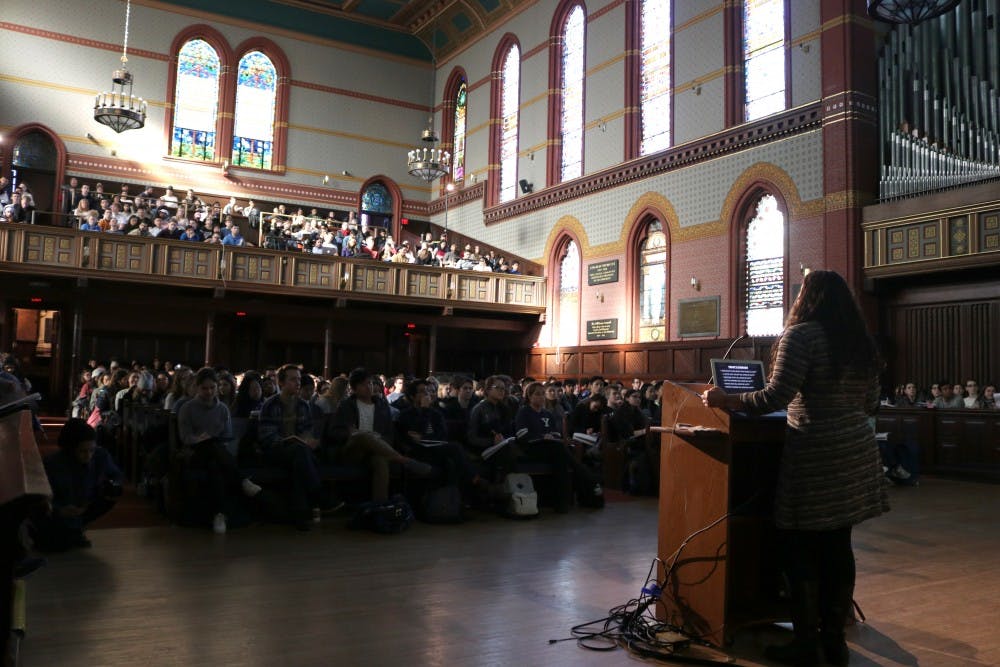
Over 1,200 students at Yale enrolled in "Psychology and the Good Life," pictured above, when it first opened this semester. (Kai Nip, Yale Daily News)
With mental health at the forefront of classroom discussions across the country, psychology professors and experts at Penn say they plan to become more involved in improving student mental health on campus.
Penn’s Positive Psychology Center suggests that one solution to helping students be happy is simply teaching them how.
While Penn has been developing its positive psychology program, compared to some other Ivy League institutions like Yale and Harvard universities, however, some say Penn appears to be lagging behind.
This semester, a course at Yale intended to instruct students how to lead a happier life became the most popular class in the university’s history. Over 1,200 students — nearly one fourth of Yale undergraduates — enrolled in "Psychology and the Good Life" when it first opened this semester. A psychology class at Harvard with the same premise was taught in spring 2006 and 2015 to 1,400 undergraduates and also stands as the most popular class in the school’s history.
Despite being one of the only Ivy League institutions with a Positive Psychology Center, directed by the "father of positive psychology" Martin Seligman, Penn still does not provide large-scale classes in the field to undergraduate students.

Penn’s Psychology Department offers courses in abnormal psychology and positive psychology to undergraduates, but they are not as large as those offered at Yale or Harvard. Abnormal psychology, for instance, was capped at 120 students this semester.
These courses are amongst the most popular classes in the Psychology Department, according to Undergraduate Director of the Psychology Department Robert Kurzban.
Last year, students in the Master of Applied Positive Psychology program introduced an initiative called "The Penn Program for Flourishing," which aimed to provide students with "a toolkit for thriving in school and life." The eight-week program, though not a formalized course, was open to all undergraduates.
David Yaden, a Ph.D. student and research fellow at Penn’s Positive Psychology Center said that instituting a larger course would be valuable for Penn.
“As students become more and more scientifically literate they want to know what the research has to say,” Yaden said, adding that the popularity of similar courses at Harvard and Yale “speaks to a desire in a lot of students to understand what research has to say about how to live a good life [and] increase their well-being.”

Marianne Ayala, a Yale sophomore taking the course this semester, said she took the course to take advantage of the opportunity to learn how to actively make herself happier.
“It’s getting people to think about their mental health more and how they can make campus culture better,” Ayala said. “At any Ivy League school you have an underlying competitive nature and so having a class like this will help relieve people’s stress a little bit."
Penn's Positive Psychology Center plans on revamping efforts to respond to increasing student needs, according to Director of Education and Senior Scholar of the center James Pawelski.
Researchers at the center emphasized the importance of integrating positive psychology into student life.
Alejandro Adler, the director of International Education of the center, said there is a need for an expanded course offering in positive psychology, as well as education that goes beyond the classroom setting.
“Take New Student Orientation as an example, it’s a key moment and a fertile ground of transition where we can embed these life skills into incoming freshmen,” Adler said.
Among the most notable work done by the center is the development of Penn Resilience Programs, a set of "evidence-based training programs that have been demonstrated to build resilience, well-being, and optimism," according to its website. The program has previously been delivered to corporations, the military, and even governments internationally.
Karen Reivich, the director of Resilience and Positive Psychology Training Programs, said her center has plans to extend the Penn Resilience Program to students as well, as part of the education in positive psychology.
“That’s a major thing we’re pushing to do," Reivich said. "We’re looking to take all of these programs done internationally and essentially bring it back to students here. It’s the highest one on my personal list of priorities.”
However, College junior Scott Rubenstein, the new member training director of Penn Benjamins, expressed doubt about how effective adding courses in the curriculum would be.
“These courses might be taken by self-selected groups of students, like for example, psychology majors,” Rubenstein said.
He supported the idea of integrating positive psychology education during NSO, as opposed to through formalized courses.
“I know education on consent and sexual violence during NSO has been quite effective, so expanding programs on mental health during that period could be very helpful,” he said.
The Daily Pennsylvanian is an independent, student-run newspaper. Please consider making a donation to support the coverage that shapes the University. Your generosity ensures a future of strong journalism at Penn.
Donate






